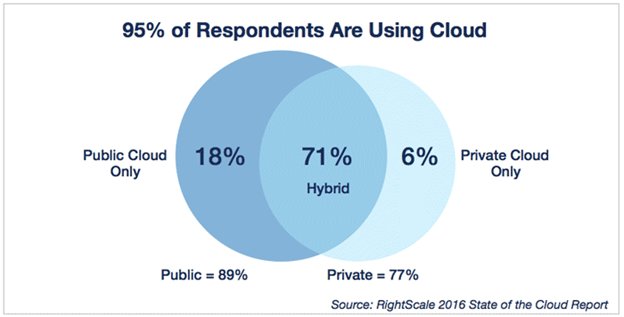How to Leverage Cloud for Successful Digital Transformation?
We have witnessed a massive technological evolution over the years. From Social Media to IOT, Mobility and Cloud – emerging platforms, products, ideas and technologies have changed both the organizations and the consumers. Evolving digital technologies have transformed consumer behaviour which in turn has led to a demand for a dynamic, Agile and customer centric businesses.
In this dynamic world, stagnant organizations can easily lose out to competition. The only way organizations can survive disruption and transform their business models is by digitally transforming themselves. Digital transformation can bring business agility helping to remain competitive.
An important component of a successful digital transformation strategy is your IT infrastructure overhaul and modernization, moving away from the legacy and traditional systems. Of the many digital advances, Cloud DevOps adoption has seen a tremendous growth enabling organizations with an easy and swift IT overhaul. Organizations are embracing Cloud owing to its many benefits such as cost efficiency, scalability, flexibility and more.
According to a report from Cloud Industry Forum, “79% of respondents whose organisations have implemented a Digital Transformation strategy say that Cloud is important/very important to it.”
Rightscale 2016 State of the Cloud Report also echoes the fact stating “Of 1040 technology respondents 95% are using Cloud.”

Organizations are blending private, public and on-premise solutions to achieve the goal of modernization and IT environment. However, implementing Cloud and leveraging it for Digital Transformation is challenging. Moving the applications to Cloud or developing new digital products using Cloud is a complex process.
Here’s how you can leverage Cloud for digital transformation:
1. Understanding the benefits of adopting Cloud
Cloud adoption has significantly increased over the years. Businesses evolving in nature with fluctuating needs can resort to Cloud as it facilitates flexibility to scale up or down basis the requirements. With Cloud, there is no need of procuring hardware thereby reducing the total cost of ownership. Cloud also provides enhanced collaboration, quick disaster recovery and immense mobility with boundary-less IT environment. Cloud is fundamental to IT infrastructure modernization.
2. Considering technical aspects of IT modernization – The entire process of infrastructure modernization starts with planning of hardware and software inventories. The next step is to identify the IT and business processes to be changed, design the environment, and check if there is a need to engage an external vendor. However, prior to going ahead with Cloud deployment, pen down the migration goals. After a thorough cost benefit analysis, proceed with the Cloud deployment and migrate the data and systems to the new setup.
A few things to consider for vendor selection:
- Skills and experience
- Knowledge about ITIL standards
- Global delivery capabilities
- Performance based SLAs
- Support for multi-vendor hybrid environment
- Data integrity and security policies
3. Thinking economies of scale – The multi-tenancy based solutions are deployed on one single hardware with pooled resources shared among various users, bringing economies of scale. Cloud driven companies also practise IT standardization for controlling the size and cost of compute resources.
4. Building new products, business models and revenue streams – Companies striving to digitally transform themselves are looking to add new revenue streams, change the existing business model and build innovative products through outsourced software product development services. A robust Cloud platform provides all these opportunities. Companies leverage Cloud to reengineer their business models and stay competitive. While legacy companies need to plan for resources in advance, companies embracing Cloud can scale up or down on demand. Moreover, Cloud helps to accelerate experimentation, delivery services and testing cycles leading to a faster time to market. Over and above building new products that contribute to new revenue streams, Cloud helps to generate revenue by decreasing the latency and reducing the downtime through regional or dedicated networks.
5. Energizing customer relationships – Cloud not only helps to transform business models, inject operational efficiency and build new revenue streams, but also helps to energize customer experience and relationships. With centralized data management, accessing information in one go becomes easy. Structured data could be clustered and further analyzed to drive contextual and personalized campaigns leading to improved customer experience.
6. Considering automation (DevOps) – Digital Transformation isn’t about implementation of digital technologies alone, but practising change management across the organization. Cloud and DevOps go hand in hand. Digitally evolving and mature companies both alike practise DevOps as it helps to automate the delivery pipeline and orchestrate the entire IT infrastructure. The entire concept of remote DevOps is to automate redundant tasks and shorten the release cycles.
Clearly, Cloud has been a key enabler for successful digital transformation. Digitally mature companies have seen the benefits of cloud adoption. Companies in early stages of transformation should certainly embrace cloud and leverage its potential for infrastructure modernization thereby impacting the overall growth and user experience.


Hi Kinshuk,
Cloud has a major role to play in Digital Transformation. Like you have mentioned,’ Cloud not only helps to transform business models, inject operational efficiency and build new revenue streams’. It was an interesting read. Digital Transformation is the new revolution today and requires a lot of testing and development support. On these lines, we have published an interesting blog titled ‘Why is QA Transformation essential for successful Digital Transformation?’. It deliberates on the role that QA transformation plays in the Digital Transformation journey. Your readers might like it too.
Regards,
Michael
Thanks Michael, am glad you liked the blog. Sure, will have a look at your blog 🙂